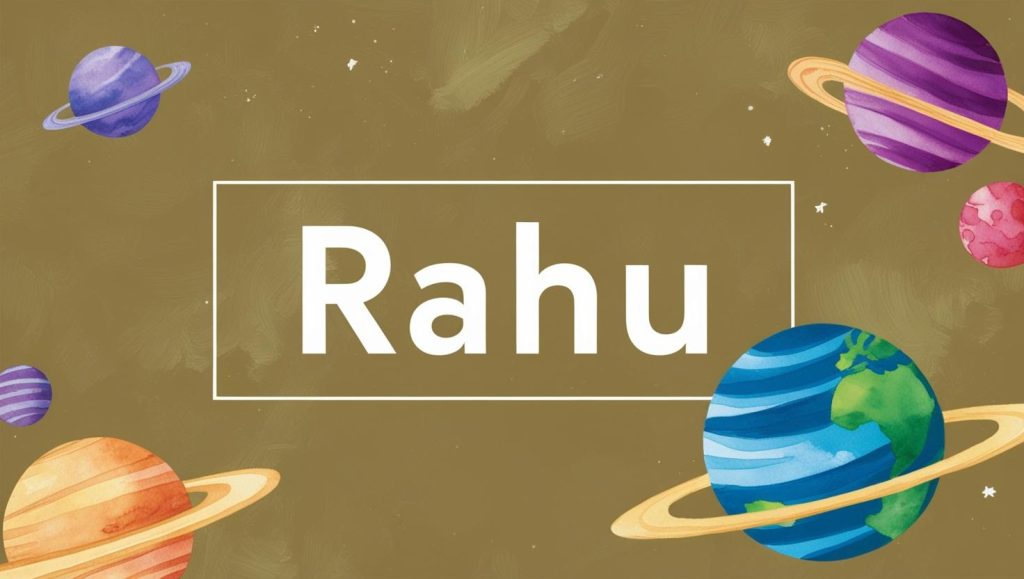The fourth house in Vedic astrology represents the foundation of life—it is the house of home, mother, inner peace, emotional security, property, comforts, and upbringing. It governs one’s relationship with their roots, heritage, homeland, and sense of belonging. A strong fourth house brings inner contentment, a stable home environment, and emotional balance.
When Rahu, the north node of the Moon, occupies this house, it introduces an intense desire for emotional fulfillment and domestic success, but through unconventional or non-traditional means. Rahu magnifies and distorts whatever it touches, often making the native’s search for emotional security more complicated, obsessive, or karmically charged.

The Influence of Rahu in the Fourth House
Rahu in the fourth house typically creates a deep longing for inner peace and emotional stability, yet the native may feel like that peace is always out of reach. This can lead to constant restlessness—within the heart and within the home. The individual may change residences frequently, have difficulty bonding with family members, or seek fulfillment through external status and material comforts, hoping to compensate for the void within.
This placement often produces people who are determined to build a better life than what they experienced in their childhood. If their early environment lacked warmth, safety, or nurturing, Rahu compels them to chase emotional security in adulthood—though not always in healthy ways. It may lead them toward luxury, real estate, political influence, or property investments as substitutes for emotional grounding.
Complicated Relationship with Mother and Family
Rahu in the fourth house often indicates karmic complexity with the mother or maternal figures. The relationship may be emotionally distant, inconsistent, or marked by strong highs and lows. The native may feel misunderstood, emotionally unsupported, or disconnected from their mother’s values or lifestyle.
There might also be situations where the mother plays an unusual or controversial role—being highly ambitious, manipulative, foreign, absent, or deeply spiritual. In some cases, she could be a catalyst for the native’s desire to break free and create their own version of home and security.
Family life, in general, may be filled with non-traditional dynamics, misunderstandings, or sudden changes. The individual often feels like they do not truly belong where they were born, driving their desire to create a space that reflects their personal vision of comfort and emotional safety.
Restless Domestic Life and Home Environment
Rahu in this house brings instability and unpredictability to home life. The person may move frequently, live abroad, or choose non-traditional housing arrangements. There may be discomfort with staying rooted in one place or an ongoing need to escape familiar surroundings.
While the native may crave a beautiful, luxurious, or high-status home, once they attain it, they may still feel unsatisfied. The issue is not external—it is internal unrest, a karmic hunger for peace that cannot be filled through material comforts alone.
Over time, this placement pushes the individual to understand that home is a state of mind, not a physical location. True peace comes from within—not from properties, possessions, or appearances.
Emotional Intensity and Inner Conflict
Emotionally, Rahu in the fourth house creates intensity and conflict. The person may struggle with mood swings, anxiety, or a feeling that something is always missing. This emotional unease can impact relationships, decision-making, and the ability to feel settled.
Often, the person looks for peace in outward success—through status, career, recognition, or luxurious living. But as life progresses, they begin to understand that external achievements cannot replace inner tranquility.
Meditation, therapy, or deep introspection becomes essential. Once they stop chasing peace and start cultivating it internally, Rahu’s grip begins to loosen.
Obsession with Property, Status, and Social Image
This placement often drives the person to accumulate property, wealth, or public admiration as a way of compensating for internal insecurity. They may want to be seen as successful, admired for their home or lifestyle, or respected for their achievements in domestic or political arenas.
While this drive can lead to success in real estate, politics, interior design, or public service, it also comes with the risk of over-identifying with material comforts. If their emotional foundation depends solely on how others perceive their life, the inevitable ups and downs of external success can create deeper emotional instability.
Rahu’s lesson here is to detach from appearances and build a foundation rooted in emotional truth.
Karmic Patterns and Soul Lessons
Rahu in the fourth house suggests that in past lives, the native may have either abandoned domestic responsibilities or lived in emotionally restrictive environments. In this life, the soul is working through themes of security, attachment, and emotional independence.
There may be karmic baggage around the need to feel nurtured or accepted. The challenge is to stop looking outward for emotional validation and instead become one’s own source of comfort and support.
The ultimate lesson of Rahu in the fourth house is to build emotional strength from within. Only then can the native find peace in any environment and create meaningful relationships based on truth rather than need.
Final Thoughts
Rahu in the fourth house is a powerful placement that creates a restless heart and a deep hunger for belonging. It pushes the individual to question their roots, redefine family values, and seek emotional fulfillment through non-traditional means. While it may bring instability early in life, it offers profound growth over time.
With awareness, the native learns that emotional peace is not something to chase—it is something to nurture from within. Once they turn inward and embrace their truth, Rahu’s energy transforms. The once restless seeker becomes a wise soul, grounded not in a house, but in the home of their own heart.
